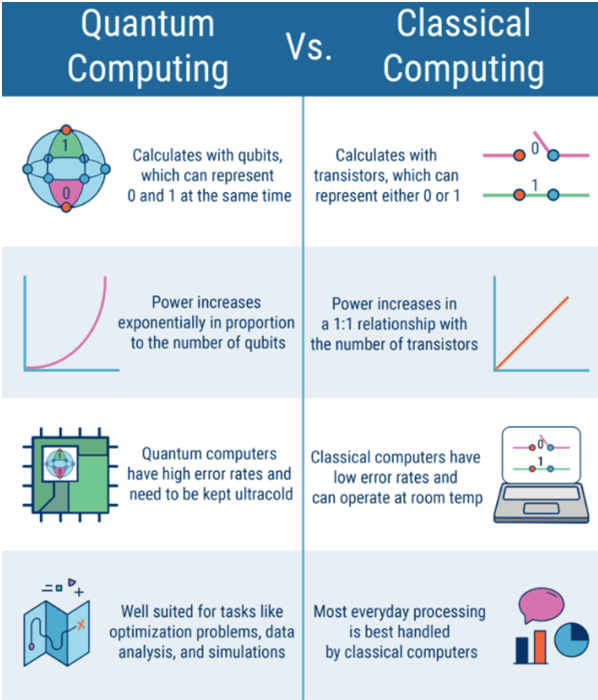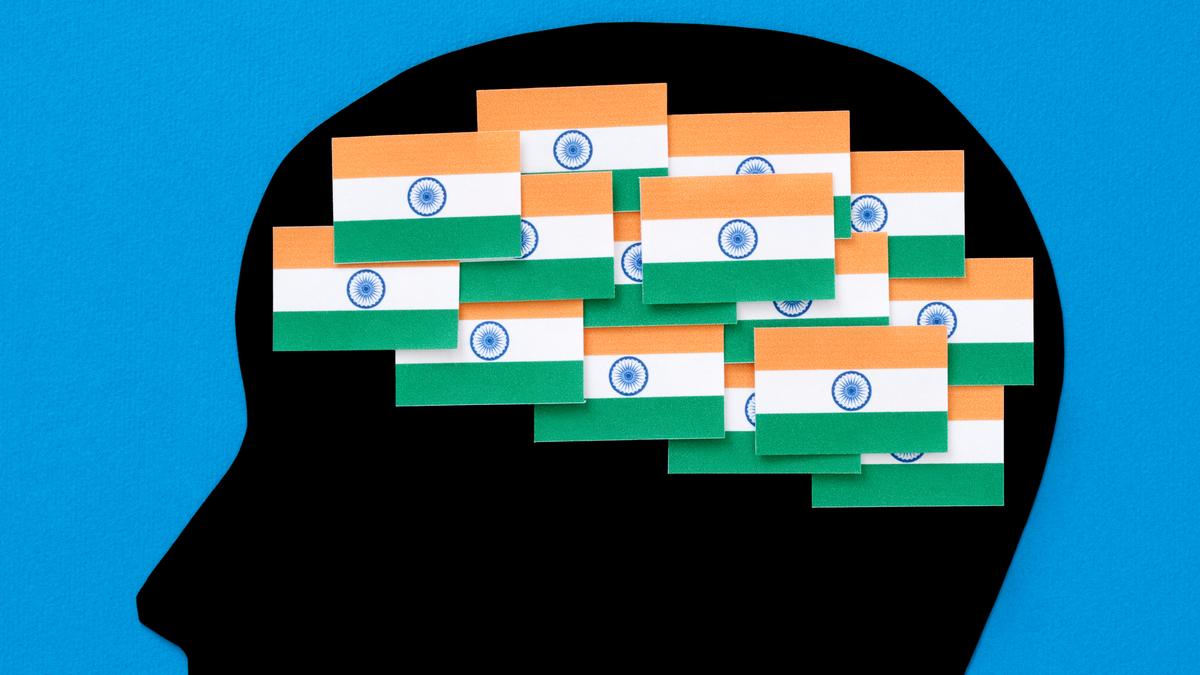- Courses
- GS Full Course 1 Year
- GS Full Course 2 Year
- GS Full Course 3 Year
- GS Full Course Till Selection
- Answer Alpha: Mains 2025 Mentorship
- MEP (Mains Enrichment Programme) Data, Facts
- Essay Target – 150+ Marks
- Online Program
- GS Recorded Course
- Polity
- Geography
- Economy
- Ancient, Medieval and Art & Culture AMAC
- Modern India, Post Independence & World History
- Environment
- Governance
- Science & Technology
- International Relations and Internal Security
- Disaster Management
- Ethics
- NCERT Current Affairs
- Indian Society and Social Issue
- NCERT- Science and Technology
- NCERT - Geography
- NCERT - Ancient History
- NCERT- World History
- NCERT Modern History
- CSAT
- 5 LAYERED ARJUNA Mentorship
- Public Administration Optional
- ABOUT US
- OUR TOPPERS
- TEST SERIES
- FREE STUDY MATERIAL
- VIDEOS
- CONTACT US
What is Quantum Computing?
What is Quantum Computing?
- Quantum computing is a new type of computing that has the potential to solve complex problems much faster than today's classical computers.
- It uses the principles of quantum mechanics, which is the science that studies the behavior of tiny particles like atoms and electrons.
- The idea of quantum computing was first suggested by Richard Feynman in 1982.
- He thought that normal computers wouldn’t be able to simulate quantum systems properly, so a new type of computer was needed.
- This led to the development of quantum computers.

Classical Computers vs Quantum Computers
- Classical Computers:
- These are the computers we use every day. They work with bits, which can either be 0 or 1.
- All information, whether it's text, images, or videos, is turned into combinations of 0s and 1s (called binary code).
- Quantum Computers:
- These computers use quantum bits, or qubits. Unlike classical bits, qubits can be in both 0 and 1 at the same time, thanks to a property called superposition.
- This allows quantum computers to solve problems much faster than classical computers, which can only handle one state at a time.
Key Principles of Quantum Computing
Quantum computers rely on two main ideas from quantum physics:
- Superposition: A qubit can be in a state of 0, 1, or both at the same time. Imagine a spinning coin—while it's spinning, it is both heads and tails until it lands.
- Similarly, a qubit can do many calculations at once.
- This makes quantum computers much more powerful than classical ones, as they can process many possibilities simultaneously.
- Example: A classical computer has to check each possible solution to a problem one by one. A quantum computer can check many solutions at the same time.
- Entanglement: When two qubits become entangled, they become linked in such a way that the state of one qubit instantly affects the state of the other, no matter how far apart they are.
- This means that by measuring one qubit, you can learn information about the other qubit right away.
- Example: If you have two gloves, one in each box, and open one to find the left glove, you instantly know that the other box contains the right glove. This instant connection between qubits speeds up calculations.
Important Milestones in Quantum Computing
- Shor's Algorithm (1994): Peter Shor developed an important algorithm that showed quantum computers could factor large numbers in seconds—something that would take classical computers millions of years to do.
- This has major implications for data security since many encryption methods rely on the difficulty of factoring large numbers.
- Quantum Supremacy (2019): In 2019, Google announced that its quantum computer, Sycamore, had achieved quantum supremacy.
- This means Sycamore was able to solve a task in 200 seconds that would take the world’s most powerful classical supercomputer 10,000 years to complete.
- This showed that quantum computers can solve some problems much faster than classical computers.
- IBM’s Q System One (2019): IBM introduced Q System One, the world’s first quantum computer available for commercial use.
- This system uses quantum circuits (like logic circuits in classical computers) to manipulate qubits and solve complex problems.
- Google’s Willow Quantum Chip (2024): Google recently unveiled a new quantum chip, Willow, which improves error correction in quantum computing.
- This means that quantum computers can now handle more complex problems with less risk of making mistakes, a major step forward in making quantum computing reliable.
Why is Quantum Computing Hard to Build?
While quantum computing is exciting, there are still many challenges:
- Error Rates and Decoherence: Qubits are very sensitive to changes in their environment. If the qubit is disturbed by noise or temperature changes, it can lose its quantum state.
- This is called decoherence. Keeping qubits stable long enough to do calculations is one of the biggest hurdles.
- Scalability: Current quantum computers have only a small number of qubits (usually tens or a few hundred).
- To tackle really big problems, we need quantum computers with thousands or even millions of qubits. Building a system with so many stable qubits is a major challenge.
- Cost and Complexity: Quantum computers need very low temperatures (close to absolute zero) to work, which makes them very expensive to build and maintain.
- This is another reason why they are still not widely used.
Real-World Applications of Quantum Computing
Quantum computers could revolutionize many areas by solving problems faster and more efficiently than classical computers:
- Cryptography: Quantum computers could break current encryption systems that rely on the difficulty of factoring large numbers.
- This could change how we secure data online and make quantum-resistant encryption a necessity.
- Drug Discovery: Quantum computers could simulate the behavior of molecules, helping scientists discover new drugs and materials.
- This is much faster and more accurate than current methods.
- Optimization Problems: Quantum computers are very good at solving complex optimization problems, such as finding the best way to organize data, improve supply chains, or predict stock market trends.
- Artificial Intelligence (AI): Quantum computers could help AI systems process massive amounts of data more efficiently, leading to improvements in areas like machine learning, pattern recognition, and decision-making.
India's National Quantum Mission
In 2023, India launched the National Quantum Mission, a program aimed at developing quantum technologies. The government has allocated ₹6,000 crore (around $720 million) over eight years to:
- Develop Quantum Computers: Build and improve quantum computers for scientific research and commercial use.
- Fund Research and Innovation: Support research centers, start-ups, and collaborations to advance quantum computing technology.
- Train Talent: Prepare experts in quantum computing by setting up education and training programs.
The Future of Quantum Computing
- Quantum computing is still in its early stages, but it is moving forward quickly. The challenges of error correction, scalability, and cost mean that it will take time before quantum computers are widely available.
- However, as more breakthroughs happen, quantum computers will be able to solve problems that classical computers cannot, making them extremely valuable in fields like medicine, security, and AI.
- In the future, quantum computing could open up new possibilities we can’t even imagine today, changing the way we solve problems and making a big impact on industries worldwide.
Conclusion
Quantum computing has the potential to transform many industries by solving problems much faster than classical computers. By using the unique properties of quantum mechanics—superposition and entanglement—quantum computers can perform complex calculations that would take traditional computers too long. However, there are still challenges to overcome, such as keeping qubits stable and building large-scale quantum systems.
|
Also Read |
|




